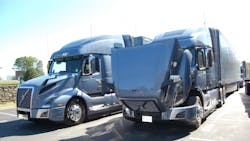ATLANTA. Göran Nyberg, president of Volvo Trucks North America (VTNA), believes that “the future is coming faster than we all expect” and that connectivity, powertrain electrification, and automation of vehicles will change the very nature of the freight hauling business.
The growth of connectivity, electro-mobility, and automation will all have a “dramatic influence” on transportation, added Keith Brandis, VTNA’s director of product planning, during a presentation here at the first inaugural North American Commercial Vehicle (NCV) show.
Brandis noted that the OEM is obtaining data on 600,000 connected vehicles across its global brands in the ongoing effort to increase the uptime of all its vehicles. By leveraging connectivity, fleets are now able to tailor vehicle parameters to different types of hauls or terrains.
“We are just now at the beginning of this very exciting area,” Brandis explained. “Being connected is the key enabler.”
Nyberg compared the latest developments in truck connectivity with the smart phone, noting that no one would purchase a particular phone if it needed to be brought into a store each time there was a recommended software update.
On a separate topic, Brandis said that while “diesel is still a very energy efficient fuel,” there is no question that electric powertrain systems will continue to rapidly develop.
Electric trucks will generally be aimed for city deliveries, although there will be more experiments in regional haul, he pointed out. That will be especially attractive in areas of the world where fuel is up to three times more expensive than in the U.S., Brandis added..
While he cautioned a lack of electric infrastructure is one of the challenges that need to be resolved, Nyberg declared “electrification is coming.”
Automation is also advancing, as VTNA and other manufacturers develop systems aimed at assisting the truck driver to be safer and more productive.
With platooning and autonomous driving, there are “challenges we as engineers admit we have not figured out,” Brandis emphasized.
About the Author
Neil Abt
Neil Abt is a former FleetOwner editor who wrote for the publication from 2017 to 2020. He was editorial director from 2018 to 2020.
